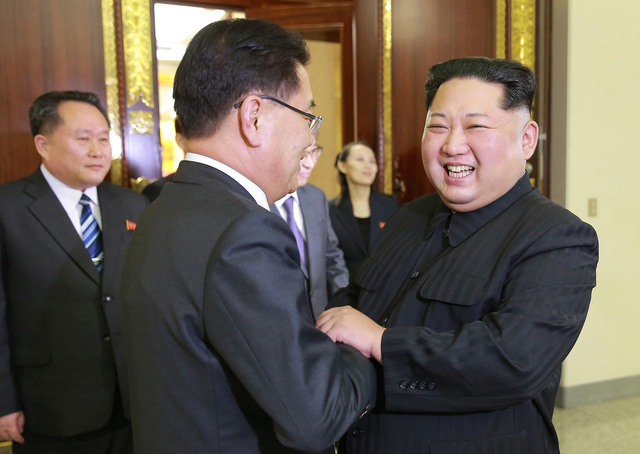Posted on : Sep.4,2018 17:37 KST
Modified on : Sep.4,2018 17:40 KST
 |
|
North Korean leader talks to South Korea’s Blue House National Security Office Director Chung Eui-yong, who headed a special envoy to Pyongyang on Mar. 5. On the far left is Ri Son-gwon, Chairman of North Korea‘s Committee for Peaceful Reunification. (Korea Central News Agency)
|
The South Korean special delegation that’s heading to North Korea on Sept. 5 is facing a more difficult challenge than on its first visit in March. To be sure, it’s important for the envoys to discuss the agenda and schedule of the inter-Korean summit that’s supposed to be held in mid-September and to deliberate ways to improve inter-Korean relations, such as by opening an inter-Korean liaison office.
But given the grave situation on the Korean Peninsula, it’s undeniable that what’s even more important is mediating the deadlocked negotiations between North Korea and the US. That’s probably also why South Korean President Moon Jae-in said that “this is a crucial time for establishing peace on the Korean Peninsula.” Since the visit to the North this month is likely to change the destiny of the Korean Peninsula, the special delegation must proceed with the determination to get groundbreaking results.
The government made the right call to have the same officials who visited North Korea back in March join this special delegation as well. Having officials who trust each other and know the issues visit North Korea should help the deliberations with the North proceed swiftly and stay on track. Nor do we need to worry that the trip is planned for a single day.
Provided that the deliberations go well, one day’s worth of meetings should be enough. The important thing is the results of those meetings. If the special delegation gets the desired results, the inter-Korean summit will not only be pulled off without a hitch, but US Secretary of State Mike Pompeo’s delayed visit to North Korea could also be pushed forward.
But the fog on the Korean Peninsula is too thick to make optimistic predictions about the situation. Whereas the first special delegation was focused on the big picture of resuming dialogue through the inter-Korean and North Korea-US summits, the second special delegation must overcome a standoff in which neither side is making concessions about implementing the agreements reached in the Singapore summit. North Korea and the US have been wrangling for several months now over which should come first – the end-of-war declaration or steps toward denuclearization.
Thrown into the mix is the variable of the trade dispute between US and the China, creating a polynomial equation that this special delegation must try to solve. The implementation of the summit agreement has been blocked by the “devil in the details,” so exorcising that devil could be described as the delegation’s mission.
While it’s true that the situation has become more challenging, there are some encouraging aspects, too. Both the US and North Korea are pressed for time, each for its own reasons. The opportunity afforded by September – when the inter-Korean summit and the UN General Assembly are both scheduled – is one that mustn’t be squandered. If the special delegation manages to produce a compromise acceptable to both North Korea and the US during its meeting with North Korean leader Kim Jong-un, the fog covering the Korean Peninsula could quickly clear up.
South and North Korea need to find a solution through candid discussions based on the trust they’ve built. The special delegation could also consider urging the North Koreans to take bold preemptive action based on their trust of the South Korean government. In order for the North to break through the impasse with the US, it must also utilize the opportunity presented by special delegation’s visit.
Please direct comments or questions [english@hani.co.kr]









